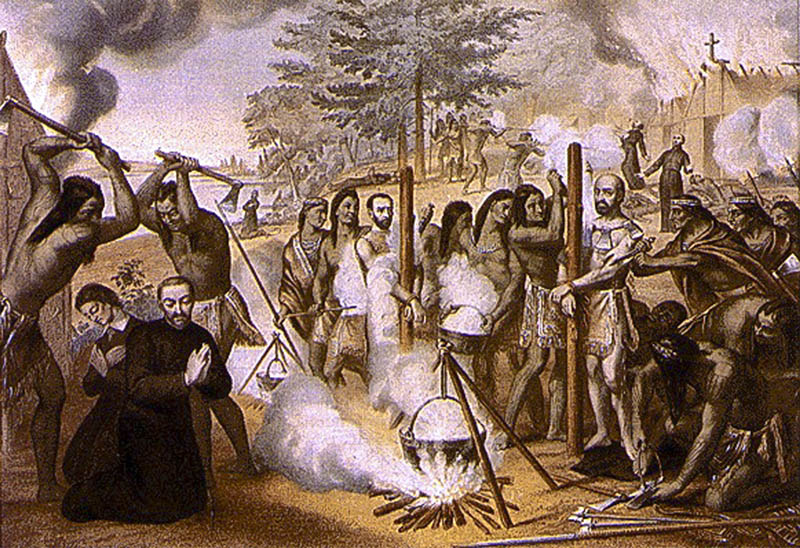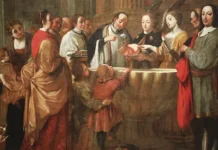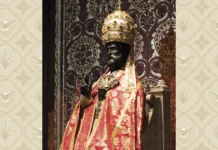To win children for the Holy Catholic Church is the most important work of charity. Since Benedict XV, the Pontiffs have published documents with the special purpose of instructing and encouraging those who undertake this task.
What does it mean to be a missionary ?
Before returning to His Father, Our Lord Jesus Christ said to His disciples: “Go into the whole world and preach the Gospel to all creation” (Mk 16:15). With these words He committed to them a momentous and holy charge, which would not end with the death of the Apostles but would bind their successors, one after another, until the end of the world – that is, as long as there remained on this earth men whom the truth might set free. […]
Even during the first three centuries, when the fury of the persecutions, unleashed by Hell, inundated the whole of civilization with Christian blood, out on the far frontiers of the Roman Empire the heralds of the Gospel journeyed, announcing their tidings. Then, after peace and religious freedom had been officially granted to the Church, her apostolate to the world made far greater progress. In this achievement, a number of men of striking sanctity played outstanding roles. […]
Many of these, striving for the salvation of their brethren, themselves attained the heights of sanctity, as the Apostles did before them. Many others crowned their apostolate with the glory of martyrdom, sealing their faith with their blood.

And to anyone who weighs these facts the realization is a motive for consternation that right now, there still remain in the world immense multitudes of people who dwell in darkness and in the shadow of death […].
From the days when We first took up the responsibilities of this apostolic office, We have yearned to share with them the divine blessings of the Redemption. So We are delighted to see that, under the inspiration of the Spirit of God, efforts to promote and develop the foreign missions have in many quarters of the world increased and intensified. […]
But for those who enter the apostolic life there is one attribute that is indispensable […] sanctity of life. For the man who preaches God must himself be a man of God. The man who urges others to despise sin must despise it himself […]. Give the missionary, if you will, every imaginable talent of mind and intellect, endow him with the most extensive learning and the most brilliant culture. Unless these qualities are accompanied by moral integrity, they will be of little or no value in the apostolate. On the contrary, they can be the cause of disaster, both to himself and to others.
Let the missionary, then, be humble, obedient and chaste. And especially let him be devout, dedicated to prayer and constant union with God, fervently pleading the cause of souls before Him. For as he binds himself more and more closely to God, he will receive the grace and assistance of God to a greater and greater degree. […]
With these virtues, the missionary will open for the Faith he preaches a smooth and unobstructed entrance into people’s hearts; for no man’s will is obdurate enough to resist them. Like his model, the Lord Jesus, the good missionary burns with charity, and he recognizes even the most abandoned unbelievers as God’s children, redeemed by the same Blood. Their lowly state does not exasperate him; their immorality does not dishearten him. His bearing toward them is neither scornful nor fastidious; he does not treat them harshly. Instead, he seeks to attract them with all the tenderness of Christian kindness, so as to lead them into the embrace of Christ, the Good Shepherd. […]
What obstacle can arise, what annoyance or danger exists that could deter this messenger of Jesus Christ? There is none. This man, who has attained favour with God who called him to such lofty work, will cheerfully endure whatever adversity or hardship befalls him – toil, scorn, want, hunger, even a dreadful death – to free even one soul from the jaws of hell.
Excerpts from: BENEDICT XV. Maximum
illud: AAS 11 (1919), 440-450
The Greatest Work of Charity
There is no need to insist how foreign it is to the virtue of charity, which embraces both God and men, for the members of Christ’s Church not to think of those unfortunate souls who live in error outside the fold.
The obligation of charity, which binds us to God, demands not only that we strive to increase by every means within our power the number of those who adore Him “in spirit and in truth” (Jn 4: 24) but also that we try to bring under the rule of the most loving Redeemer as many other men as possible in order that “the profit in His Blood” (Ps 29:10) may be the more and more fruitful and that we may make ourselves the more acceptable to Him to whom nothing can possibly be more pleasing than that “men should be saved and come to the knowledge of the truth” (cf. 1 Tm 2:4).
Since Jesus Christ has proclaimed that the special sign of discipleship with Him is reciprocal love (cf. Jn13:35; 15:12), can we give a mark of greater love for our neighbours than to help them to abandon the darkness of error by instructing them in the true faith of Christ? In fact, this type of charity surpasses all other kinds of good works inspired by love just as the mind surpasses the body, Heaven surpasses earth, and eternity surpasses time.
Excerpts from: PIUS XI. Rerum
Ecclesiæ: AAS 18 (1926), 68
Two Battlefields: For Christ or Against Christ

Venerable Brethren, you are well aware that almost the whole human race is today allowing itself to be driven into two opposing camps, for Christ or against Christ. The human race is involved today in a supreme crisis, which will issue in its salvation by Christ, or in its dire destruction. The preachers of the Gospel are using their talents and energy to extend the Kingdom of Christ; but there are other preachers who, since they profess materialism and reject all hope of eternal happiness, are trying to drag men down to an abject condition.
With all the more reason, then, does the Catholic Church, most loving mother of all men, call on all her children to be zealous in helping these intrepid missionaries by their offerings, by prayer and by fostering missionary vocations. In motherly fashion she compels them to wear the livery of tender compassion (cf. Col 3:12), and to take part, if not in the actual apostolate, at least by communion of heart, and not allow the wish of the most loving Heart of Jesus to remain unrealized, who “came to seek and to save what was lost” (Lk 19:10).
Excerpts from: PIUS XII. Evangelii
præcones: AAS 43 (1951), 527-528







